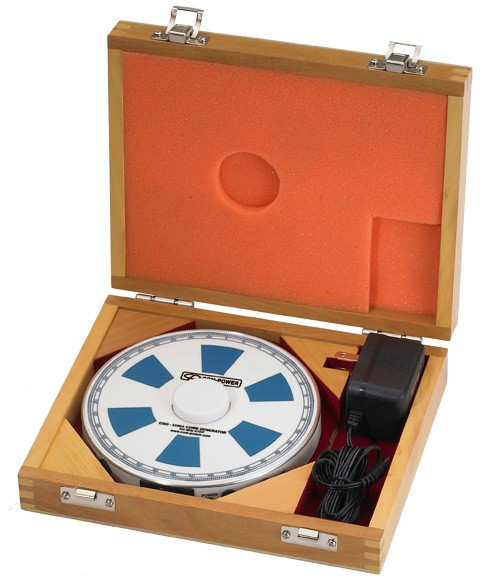Com-Power CGO-5100A Overview
The Com-Power CGO-5100A Comb Generator is a radiated reference signal source. It is a self-contained source of signals consisting of frequency harmonics at 100 MHz intervals, and is usable from 1 GHz up to at least 18 GHz. The signals generated by CGO-5100 are stable and can be used as reference signals for validating OATS (Open Area Test Sites) that are utilized for EMC testing.
The Comb Generator CGO-5100 has internal circuitry, which is designed to make its output stable, precise and close to the emission limits for FCC Part 15 and EN 55022. The CGO- 5100 Comb Generator has an Omni directional built-in antenna, which works in conjunction with the chassis of the unit. The circular chassis of the Comb Generator helps radiate the signal uniformly in all directions in the horizontal plane. The built-in antenna of the CGO 5100 provides improved signal stability, however it cannot provide conducted reference signals.
The CGO- 5100 Comb Generator is powered by a rechargeable internal battery pack. The internal power eliminates the need for an external power cable and its effect on the radiated signal pattern or level. When the battery voltage drops below a reliable operating level, the RF circuit is shut off automatically. This feature prevents an invalid output from the Comb Generator. When fully charged, the battery allows continuous use of the Comb Generator for up to 18 hours.
Features:
- Reference Source for OATS Verification
- Usable Frequency Range to 18 GHz
- Amplitude Variation Less Than ± 2 dB
- Auto RF Shutoff With Low Battery Voltage
- Omni-directional
Application
Radiated emissions measurements for EMC are usually conducted on an Open Area Test site (OATS) or an anechoic chamber. OATS and chambers must be calibrated before use in accordance with published calibration procedures at regular intervals. These calibration methods are too elaborate and time consuming to be performed before each test to ensure that the data taken is consistent and accurate. However, the generally specified one-year calibration cycle is too long to find out about any problem with the site or associated test equipment.
The Comb Generator is a tool to solve these problems. The test engineer should keep a daily log of a few Comb Generator radiated readings before starting his test. He is able detect potential problems with site by monitoring any change in the readings. For example, any problem or change with antenna, cables, preamplifier, attenuator or receiver will be reflected in the Comb Generator data with the same setup. The same method can be utilized when EMC emissions measurements for a product varies with sites. The Comb Generator can be used to determine if the test sites are causing the variation. Without such a reference source, it would be extremely difficult to compare several sites.
The comb Generator can also be used to check the shielding effectiveness of an enclosure.
[split]
|
Frequency Range |
1 GHz - 18 GHz |
|
|
Frequency Step Size |
100 MHz |
|
|
Amplitude Variation |
± 2 dB |
|
|
Batteries |
3.6 V NimH |
|
|
Battery Charger |
Input |
90-240 VAC, 50/60 Hz |
|
Output |
6 VDC @ 500mA |
|
|
Plug type |
2.5mm x 5.5mm (center pos.) |
|
|
Dimensions |
8” circular x 1” (19.2 cm circular x 2.4 cm) |
|
|
Weight |
1 lb. (0.45 kg) |
|







